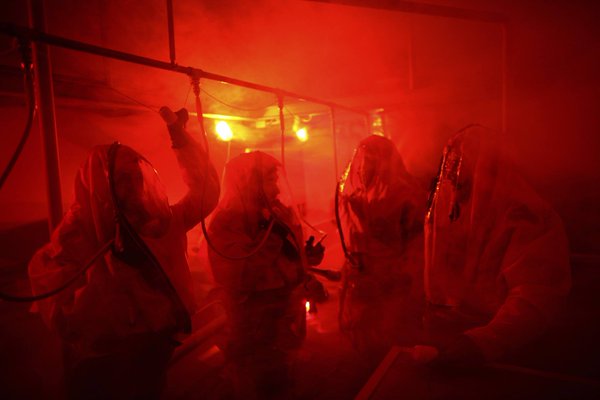Conflict in Israel: where has the Geopolitical Commission gone?
(B2) The frozen conflict between Israel and Palestinians has suddenly reawakened. Above all, don't say it too loudly in Brussels. Ursula von der Leyen's "geopolitical" European Commission is on vacation!

The awakening of a conflict
Starting with repressed riots on the esplanade of the Mosques, the conflict took a sharper turn with rockets from Gaza and the Israeli response to air strikes on the Palestinian enclave. On a daily basis (an objective indicator), we reach a figure of 30 deaths / day (1). Without the European Commission, proclaimed 'geopolitics' by Ursula von der Leyen, interrupting its break. Extended Ascension weekend requires!
Only diplomats are on deck
As usual, Josep Borrell, the High Representative of the Union, makes phone calls to Foreign Minister Gabi Ashkenazi, Palestinian Authority President Mahmoud Abbas, and so on. It multiplies calls for de-escalation. Without much hope. Europe seems sluggish, waiting for the United States to set the pace for a ceasefire, incapable of taking an initiative, or even of thinking about a solution (2).
The sofa strategy
Where has the "geopolitical" European Commission promised by Ursula von der Leyen gone? Is it fully mobilized to prepare an initiative, in an emergency meeting? Where did the anger of the same von der Leyen go, disappointed at not having her place on the international scene? Pushing a 'hum hum' of dissatisfaction because you are not entitled to a nice armchair in Ankara is easy (read: The sofa strategy. Of power and brutality). Giving lessons to the whole of Europe in front of the European Parliament is easy (read: In Ankara, the 'sofagate', a mirror held up to European weaknesses). Deciding on a sensitive international conflict seems more delicate.
A glaring lack of initiative
However, the European Parliament has repeatedly called on the Europeans to take the initiative. In September 2015, in particular, it voted for a resolution for the Union to play a genuine political role in the peace process between Israelis and Palestinians. Without reaction. The dynamics of a peace initiative, often promised for example by Federica Mogherini, never materialized. The big one Middle East peace initiative, launched by France in January 2017, vanished into the sands. European states are still very divided, between support for the creation of a Palestinian state or the sole state of Israel (3). Clearly, today we would like a little 'hum hum' from the Commission on the conflict in the Middle East.
The end of certain taboos
To take the initiative is to take a risk. In effect. This would require recognizing the changing facts on the ground. The Oslo process, with the two-state solution, seems out of reach, at least in the state of forces today. Some European diplomats recognize it off the record: the Oslo process is " in a deep coma "," moribund "... What to do ? Hugh Lovatt, a researcher from the British think-tank EFCR, suggests “ to develop a new paradigm based on equality and an end to occupation (4). It may be an idea. One could also reiterate the idea of a joint police force on the esplanade of the Mosques in Jerusalem, suggested several years ago already by certain European leaders (5). Etc. No solution is obvious. But anything is better than the current immobility.
Comment: the risk of a strategic curtailment is real
The recent episode between Tel Aviv, East Jerusalem and Gaza proves it. As long as a solution has not been found to the Israeli-Palestinian conflict, it is difficult to foresee a stabilization of the region. If it wants to be geopolitical, Europe must take the initiative. She has no other choice. For the ongoing conflict... but also for his own future. If Europe manages to influence certain conflicts of the moment (Sahel, Mozambique, Ethiopia) or on issues such as the Iranian nuclear or the political crisis in Georgia recently (6), it has also been excluded (or has excluded on its own) from the solution of major crises. From the Syrian civil war to the Armenia-Azerbaijan conflict, the examples in recent years are striking. This question is not only circumstantial. It is structural. All attentive to its internal crises (Greece, Immigration, Brexit, Covid-19, budgetary framework, etc.), sometimes very superficial (such as Sofagate), Europe is magnifying geopolitical markets. It does not anticipate enough. And, above all, it fails to react in time to the crises that arise. Result: its sphere of intervention is shrinking.
What is happening between Israel and the Palestinians could be an opportunity in a geopolitical Europe... provided it is a bit dynamic, inventive.
(NGV)
- This is not yet the figure for the previous 'war', in 2014. But for the moment it looks more like another rise in tension in 2012. Benny Gantz, now Minister of Defense, was then chief of IDF General Staff. Read : Between Israel and Gaza, the escalation. Hamas military leader killed
- « We help Palestine to survive. But we don't have the capacity to mediate. Only the United States can do this recognized Josep Borrell during a debate organized by the institute Real Instituto Elcano in Madrid on Thursday (May 13), as reported Europapress.
- « We no longer have a consensus on the parameters of this peace process recognized Jean Asselborn, the Luxembourg minister in January 2020. B2 grouped the 27 into three categories, according to their affinities with Israel or for the defense of the Palestinian cause. From the most “pro-Palestinian” to the most “pro-Israeli”. Read : Between Israel and Palestine, the hearts of Europeans swing…
- « The end of Oslo: a new European strategy for Israel-Palestine », Hugh Lovatt, EFCR, Policy Brief, 14 January 2021. To download here
- See the proposals of the Secretary of State for European Affairs, Pierre Lellouche in 2010! Read : Gaza: "No longer content to take out the checkbook but get involved"
- Lire: [Story] How did Europe manage to obtain a political agreement in Georgia?

